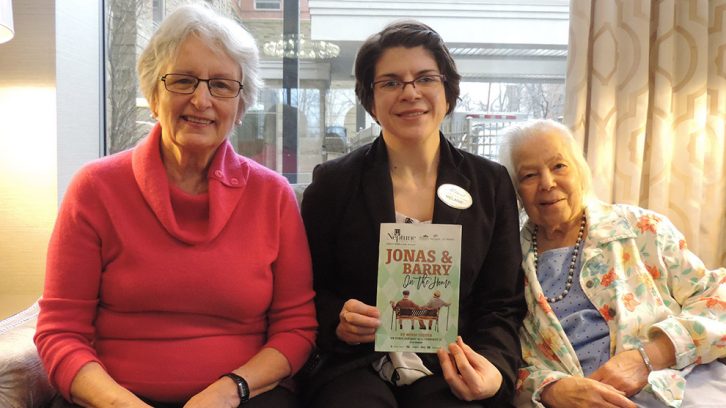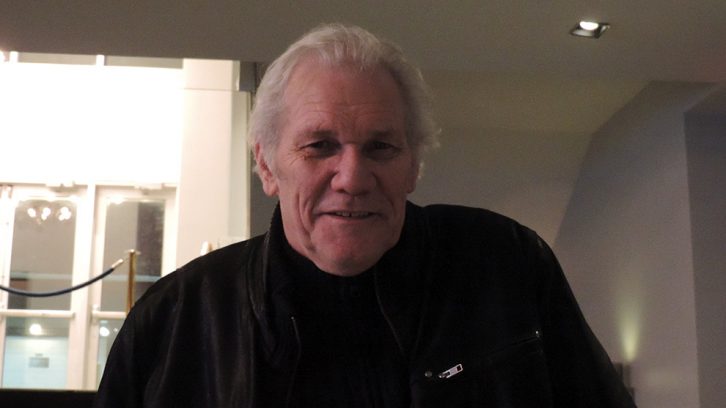RETIREMENT
Dolores and Naomi in the home: Halifax retirement home brings seniors to local play
Neptune Theatre’s 'Jonas and Barry in the Home’ takes on aging, sex, family and death in seniors residence

caption
Dolores Nickerson (left), Melanie MacLeod (centre), and Naomi Judah (right) at Parkland in the Gardens.
caption
Dolores Nickerson (left), Melanie MacLeod (centre), and Naomi Judah (right) at Parkland at the Gardens.A group of seniors is headed to the Neptune Theatre for the first time on Sunday to see a play about living in a seniors’ residence.
The play by writer and actor Norm Foster titled Jonas and Barry in the Home follows a wellness coach and two new friends at a retirement home.
The use of humour “was so delightful,” says Dolores Nickerson, 77, who saw the play before and encouraged the home to organize an event.
For residents of Parkland at the Gardens, it’s not very often media and arts get it right on senior living, says Nickerson, a retired nurse living at the residence with her husband. She says she could relate all of the conversations in the play to those she’s heard in an assisted living facility. Related stories
“I hear a lot of ‘my daughter wanted me to come (to a seniors residence),’” she says.
Melanie MacLeod, 30, much like the play’s character Rosie, is a wellness coach at Parkland. After talking with a few residents about the relevancy of the play to daily life, she and her colleagues made the arrangements with Neptune. She says they normally only take groups to stores, so this will be their first time organizing a van of nine to Neptune.
“I put a sign-up sheet up and it was full within 12 hours,” she says.
As with the facility in the play, Parkland at the Gardens is a privately run retirement home. It’s divided into independent living and assisted living for those with mobility issues.
The play’s characters encourage each other to try new things and to stay active. This is something Parkland does through activities like fitness classes, meditation and ‘Parkland University’ lecture series.
Resident Naomi Judah, 87, says she is happy when students from nearby Sacred Heart Elementary School visit.
“They are so happy and we love to see the kids at that age,” she says.
During their conversations, the characters Jonas, Barry and Rosie discuss missing having children around. Judah, MacLeod and Nickerson all say that family visits and intergenerational interactions are very important for the well being of seniors.
MacLeod says she see people struggle with the transition from living independently to assistance. With that she sees residents often struggle with accepting their aging bodies, whether it be getting arthritis or getting a walker for the first time.
That is why humour plays an important role, says Nickerson, not just in the play but at Parkland regarding how to deal with difficult conversations.
Nickerson says the men in the play were more vocal regarding sexuality, something she says senior women wouldn’t feel comfortable discussing. She knew one woman in her ’80s who would take the stairs over the elevator for privacy and avoid people talking about it. She says having healthy spaces to explore sex and sexuality often remains a challenge for seniors.
“A lot of people really look forward to meeting a partner (in a seniors home) or that it just happens,” she says.
The play’s characters encourage each other to discover new things, Nickerson says. She believes everyone should have that encouragement “to live their best life, however that looks for them.”

caption
Playwright and actor Norm Foster says “humour helps point out the drama and the drama makes the humour even funnier.”Jonas and Barry in the Home premiered in 2015. Foster says while his characters represent the group of seniors who can afford to live in a residence that costs $5,000 per month, people say it’s relatable.
He’s moved every time “(parents and their children) say ‘you hit the nail on the head.'”
He says the play was inspired by his time living in assisting living for seniors as accommodation while doing another play in Orangeville, Ont. In his experience staying at a home, Foster found a lot of people who kept to themselves.
“There was one woman who lived across the hall from me who hardly ever went out of her room,” he says. “She would only come out for one meal a day and I thought that was kind of lonely.”
Foster says it’s been suggested he write a female version of the play.
“I think I’m going to do it,” he says, “so to explore their point of view on sex, sexuality and mortality.”
About the author

Karli Zschogner
Karli Zschogner is part Nova Scotian and recently moved to Halifax for Journalism at the University of King's College. After her Bachelors in...
